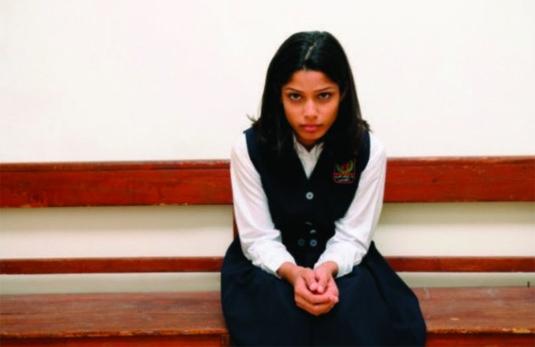With a script co-written by the Palestinian journalist Rula Jebreal, based on her 2004 book of the same title, Miral follows the interconnected lives of four women caught up in the Arab-Israeli conflict. It’s a sprawling, epic affair, directed by the New York painter turned film-maker Julian Schnabel.
The 40-year story starts in 1948 war-torn Jerusalem, where the well-heeled Hind Husseini (Hiam Abbass) comes across a few dozen orphaned children huddled together, terrified, in a side street. She takes them to one of her family homes, gives them shelter and later founds the acclaimed Dar Al-Tifl Al-Arabi institute, providing an education to orphans caught in the continuing crossfire.
One of these is Miral, played by Freida Pinto (of Slumdog Millionaire fame), who, we soon appreciate, stands in for Jebreal in this story. Born in 1973, Jebreal became radicalised after meeting an older man who was part of a terrorist cell, but who went to study in Italy on a scholarship arranged by Husseini, saving her from an uncertain fate in the process. We are also told the tragic story of Miral’s mother, Nadia (Yasmine Al Masseri), who committed suicide after an unhappy marriage to the kindly but dull and religious father Jamal (Alexander Siddig), and Fatima (Ruba Blal), a nurse who joins the cause and plants a bomb in a cinema packed with Israeli soldiers.
After a very long opening section, the film finally settles into telling Miral’s tale, but it’s 45 minutes into the movie before we see Pinto as the teenager. Unlike Husseini, though, Miral is difficult to like - spoilt, headstrong and allowing a crush on an older man to land her and others in grave danger, thus bringing the institute, which always maintained a pacific stance, into disrepute and with it possible threat of closure.
It’s a film with lots of things going on - jumps in timeline and subject, news footage interspersed with the action - and a leitmotif of shots of miral (“a little red flower that grows on the side of the road; you’ve probably seen them a million times”) blowing in the wind. But it’s poorly edited and the many and various strands don’t make a coherent whole. Much of it looks rather shoddily put together (Abbass’s ageing make-up is just dreadful), and having the actors speak throughout in English (for most of them, their second language) shows; some sound as if they are reading from an Autocue without their glasses on.
It also lacks a clear narrative and its earnestness soon begins to pall, as does the clunky exposition and political point-making. One character says to Husseini, “These children are here because they are refugees. Their homes have been destroyed.” Well, she already knows that, as do we. And the cameos by Vanessa Redgrave and Willem Dafoe, whose characters do nothing to drive the narrative, look to be rather cynical casting to bring in producers (including the Weinstein Company) and attract Oscar nominations.
By rights I should have liked this film - it wears its liberal politics on its sleeve, is made by an inventive film-maker and has some committed acting from the leads. But a fundamental flaw is that the main focus is on the wrong character: rather than being captivated by a silly schoolgirl, I was fascinated to learn about Hind Husseini, who died aged 78 in 1994, a true hero of the struggle - one who believed that books, not bullets, are humanity’s greatest weapon. She deserves to have her story told rather better than this.
Watch a trailer for Miral















Add comment